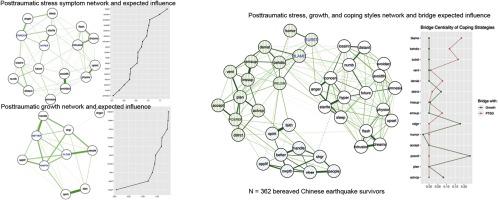Journal of Anxiety Disorders ( IF 4.8 ) Pub Date : 2021-01-16 , DOI: 10.1016/j.janxdis.2021.102359 Jacqueline Peters , Benjamin W. Bellet , Payton J. Jones , Gwyneth W.Y. Wu , Li Wang , Richard J. McNally

|
Trauma can produce posttraumatic stress disorder (PTSD), but may also foster positive outcomes, such as posttraumatic growth. Individual differences in coping styles may contribute to both positive and negative sequelae of trauma. Using network analytic methods, we investigated the structure of PTSD symptoms, elements of growth, and coping styles in bereaved survivors of a major earthquake in China. Hypervigilance and difficulty concentrating were identified as the most central symptoms in the PTSD network, whereas establishing a new path in life, feeling closer to others, and doing better things with life ranked highest on centrality in the posttraumatic growth network. Direct connections between PTSD symptoms and elements of growth were low in magnitude in our sample. Our final network, which included PTSD symptoms, growth elements, and coping styles, suggests that adaptive and active coping styles, such as positive reframing, are positively related to elements of growth, but not appreciably negatively related to PTSD symptoms. Conversely, maladaptive coping styles are positively related to PTSD symptoms, but are not negatively associated with growth. Future longitudinal studies could shed light on the direction of causality in these relationships and their clinical utility.











































 京公网安备 11010802027423号
京公网安备 11010802027423号